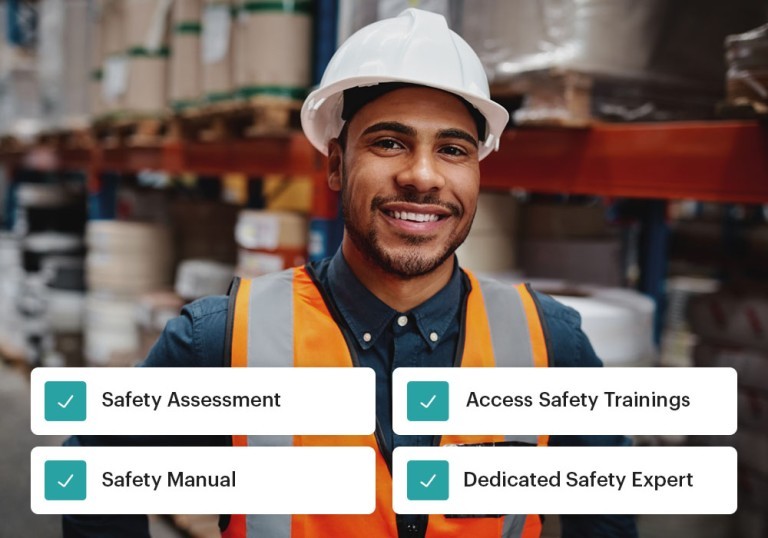OSHA Compliance and Workplace Safety Programs Made Simple
Paychex Safety Services helps you build a safe workplace by simplifying OSHA compliance, reducing the risk of workplace incidents or penalties, and providing access to expert support.

Everything You Need for a Safer Workplace
Dedicated Experts
Your assigned safety expert conducts a thorough workplace audit and provides hands-on support to address your specific hazards and compliance needs.
Custom Manuals and Training
Receive a tailored OSHA-compliant safety manual, mandatory training courses, plus access to 70+ additional safety training topics.
Proactive Protection
Manage workers' compensation costs and limit legal exposure with our proactive approach that helps prevent incidents before they happen.
Ongoing Compliance Updates
Stay up to date with regulation updates, required workplace postings, and timely reminders about safety protocols and hazard communications.
Let Us Help You Navigate OSHA Compliance Challenges
Workplace safety requires more than just good intentions. Paychex has the expertise needed to help you address the biggest compliance obstacles, including:
- Navigating complex OSHA regulations and burdensome recordkeeping requirements
- Managing compliance costs and finding time for safety program development
- Training employees across diverse roles and keeping safety protocols current
- Responding to workplace incidents and preparing for OSHA inspections

Your Path to OSHA Compliance

Full Assessment
We evaluate your current safety practices, identify compliance gaps, and assess workplace hazards specific to your operations.

Tailored Safety Solutions
Receive a tailored safety manual that meets OSHA regulations for your industry, plus a training plan designed around your specific workplace risks.

Hands-On Implementation
Our safety experts help you roll out new protocols, train your team on safety procedures, and integrate OSHA recordkeeping into your daily operations.

Continuous Support
Stay compliant with access to safety resources, regulation updates, and expert guidance as your business and OSHA requirements evolve.
Available Through Paychex HR Packages
OSHA compliance and safety services are included with all Paychex HR packages. Not sure which package is right for you? Explore your options and find the perfect fit for your business needs.

Strengthen Your Workplace Strategy
Build a comprehensive approach to employee safety and business protection with these complementary solutions:
More Resources
Recommended for you:
OSHA & Safety FAQs
-
Does OSHA Require a Safety Training Program?
Does OSHA Require a Safety Training Program?
Yes, OSHA requires employers to provide safety and health training for employees, especially in higher-risk industries like manufacturing, construction, and healthcare. Training requirements vary by industry and specific hazards but must cover employees' rights, workplace hazards, safe work practices, and emergency procedures. Paychex Safety Services provides access to 70+ OSHA-compliant training courses tailored to your industry needs.
-
What Is Required for OSHA Safety Compliance?
What Is Required for OSHA Safety Compliance?
OSHA compliance requires employers to provide a workplace free from serious recognized hazards and follow all applicable OSHA standards and regulations. This includes conducting workplace hazard assessments, implementing safety programs, providing required training, maintaining injury and illness records (OSHA 300 logs), and posting OSHA notices. Paychex helps you meet these requirements with customized safety manuals, expert guidance, and ongoing compliance support.
-
What Safety Programs Are Required by OSHA?
What Safety Programs Are Required by OSHA?
Required OSHA safety programs depend on your industry and workplace hazards. Businesses with specific hazards may also need programs for fall protection, confined spaces, or personal protective equipment. Paychex safety experts help identify which programs your business needs and assist with development of compliant documentation.
-
Who Is Subject to OSHA Compliance?
Who Is Subject to OSHA Compliance?
Most private-sector employers and their employees in all 50 states must comply with OSHA regulations. Businesses with 10 or fewer employees may be exempt from OSHA recordkeeping requirements but must still follow all safety and health standards. Certain industries like construction, manufacturing, and healthcare face stricter requirements due to higher workplace risks.
-
How Often Should OSHA Training Be Conducted?
How Often Should OSHA Training Be Conducted?
OSHA requires most safety training at initial hire with refresher training to be conducted annually (at least once every 12 months), though some specific trainings have different schedules. Additional training is required when new hazards are introduced, after workplace incidents, when employees change roles, or when safety procedures are updated. Paychex provides ongoing training resources and reminders to keep your compliance current.



